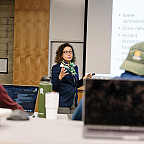Events
Green Energy Institute Webinars Address Fossil Gas, Climate Change Liabilities
As part of U.S. Climate Action Week, the Green Energy Institute (GEI) presented a webinar, Clean Energy Transition: Quitting Fossil Gas, that addressed our use of fossil gas (more commonly, but inaccurately, termed “natural gas”). Faculty Scholar and Professor Melissa Powers ’01, Jeffrey Bain Faculty Scholar and director of GEI, joined Sierra Club Staff Attorney Alison Seel and energy consultant Tarika Powell in a discussion of the risks of fossil gas, the importance of preventing new gas infrastructure, and how addressing gas in the buildings sector is part of achieving a successful clean energy transition. The presentation was moderated by Akriti Bhargava ’22.
Another webinar, Accountability for Climate Change Harms in the Pacific Northwest, focused on the growing trend of climate damages and fraud litigation in the United States. After opening remarks from Oregon Attorney General Ellen Rosenblum and Washington Attorney General Bob Ferguson, Powers moderated a panel featuring Karen Shell, associate professor and Climate Science Program head of the College of Earth, Ocean, and Atmospheric Sciences at Oregon State University; Deborah Kafoury, Multnomah County commissioner; and Daniel Mensher, attorney at Keller Rohrback.

Students and alumni mentioned in this article received support through one or more of the following scholarships: the Dean’s Scholarship and Harpole Memorial Scholarship.
Professor Lisa Benjamin Presents at ABA Webinars
Professor Lisa Benjamin participated in a series of webinars for the Civil Rights and Social Justice section of the ABA during Black History Month. She served as a panelist on Climate Effects on Communities of Color and The Challenges African Americans Face in the 20th Century. “Addressing legacy issues of environmental injustice will be difficult, but is critical to addressing other systemic issues facing BIPOC communities such as health, economic, and racial injustices,” said Benjamin. “Climate and energy transitions should not entrench existing vulnerabilities, or further marginalize communities.”
Reflecting on Trump Administration Policies
Professor Alexandra B. Klass of the University of Minnesota, the 32nd annual Environmental Law Distinguished Visitor, presented a webinar on U.S. Energy Transitions in the Trump Administration: A Law and Policy Perspective.
Food Choices and Climate
A national virtual symposium, Food for Thought: The Impact of Food Choices in a Changing Climate, addressed a variety of cutting-edge and important law and policy issues relating to the connection between food production and climate impacts.
Training Climate Change Leaders
#1 in Environmental Law—Again
Student Recognition
Clinics
email jasbury@lclark.edu
voice 503-768-6605
Advocate Magazine is published for alumni, faculty, staff, and friends of Lewis & Clark Law School.
We welcome correspondence from readers. Please be sure to include your name and location. Submissions are subject to editing.
Judy Asbury, Assistant Dean, Communications and External Relations
Advocate Magazine
Lewis & Clark Law School
10101 S. Terwilliger Boulevard MSC 51
Portland OR 97219
More Stories

Building on Excellence
We talk with incoming dean Alicia Ouellette about the inspiration she found at Lewis & Clark, her values, and strategic vision for the future.

Understanding Crimmigration
Comprehensive Discussions at Lewis & Clark Law School

Rate Your Experience
Professor Keith Cunningham-Parmeter discusses the power of customer ratings systems on gig workers and how antidiscrimination protections in employment law could be triggered.

Leaving a Lasting Legacy
A 1969 alum wanted to leave a lasting legacy to honor two people who were instrumental to his success at Lewis & Clark Law School: Judge John F. Gantenbein and Professor Ronald Lansing.


